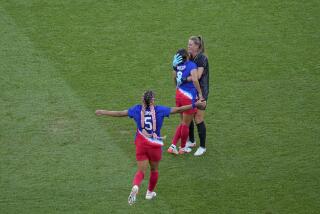Women Soccer Players Boycott Olympic Camp : Atlanta Games: Dispute involving top U.S. players hinges on rejection of contract offers.
Nine starters on what was expected to be the U.S. Olympic women’s soccer team for next summer’s Atlanta Games have rejected contract offers from U.S. Soccer, apparently in a dispute over money, and will not attend the team’s nine-day day training camp that begins today in Chula Vista.
The nine absentees include the most prestigious American players, seven of them members of the 1991 world championship team.
They are Michelle Akers, Joy Fawcett, who doubles as the UCLA women’s team coach; Julie Foudy, Carin Gabarra, Mia Hamm, Kristine Lilly, Carla Overbeck, Briana Scurry and Tisha Venturini.
All but Scurry and Venturini were starters on the team that won the Women’s World Cup in China in 1991 and all nine played on the bronze medal-winning U.S team at last summer’s world championship tournament in Sweden.
According to U.S. Soccer, the nine players “were under contract in 1995 and each was extended an opportunity to return as full-time national team players through September 1996.”
None of the recalcitrant players were immediately available for comment, although their dispute with the federation is said to be over bonuses for the Olympics and other tournaments.
Hank Steinbrecher, U.S. Soccer’s executive director, said he was deeply disappointed in the players’ decision, adding that the federation had “made good-faith offers to continue to make our players the highest-compensated women’s national team players in the world.”
Steinbrecher said U.S. Soccer had “made an unprecedented $3.4-million commitment to the women’s program last January” in anticipation of preparing for Sweden and Atlanta.
Some of the players reportedly were earning as much as $80,000 to $90,000 a year, including appearance fees from various sponsors of the national team.
“The contracts are now off the table,” Steinbrecher told the Associated Press Tuesday night. “The only way they can play is on a per diem basis, provided Coach [Tony] DiCicco asks for them.”
According to AP, the federation was willing to pay players a bonus only if they won the gold medal. The players also wanted bonuses for winning the silver or bronze.
“We cannot reward mediocrity,” Steinbrecher said. “It seems some players are more concerned about how green their shoes are, instead of bringing home the gold.”
That comment is unlikely to help resolve the dispute. The 1991 world champions are one of the most tightly knit teams in sports, with most of the players being close friends off the field.
Many of them were disappointed at what they perceived as a snub by U.S. Soccer, which, they argue, failed to capitalize on their success after they had won the world title in China.
Many would have retired from the sport by now had it not been for the chance to add a first Olympic women’s soccer gold to the first world championship gold.
Akers, for one, worked long and hard to help women’s soccer become an Olympic sport for the first time next summer.
Among national team players who will be in camp are world championship-winning goalkeeper Mary Harvey and former or present national team members Brandi Chastain, Amanda Cromwell, Jennifer Lalor, Sarah Rafanelli and Saskia Webber.
Otherwise, DiCicco has invited a dozen newcomers to camp.
The national team will open its 22-player residency camp in January at the Seminole County Sports Training Center outside Orlando, Fla., and will remain there through the Olympic Games.
The U.S. team opens Olympic play at the Citrus Bowl on July 21. Before this latest development, the team, which finished third behind Norway and Germany in the world championships, was considered one of the favorites for the gold medal.
More to Read
Go beyond the scoreboard
Get the latest on L.A.'s teams in the daily Sports Report newsletter.
You may occasionally receive promotional content from the Los Angeles Times.







